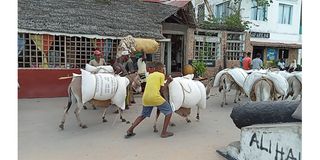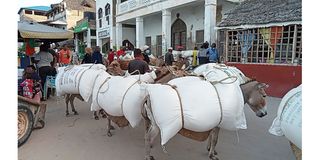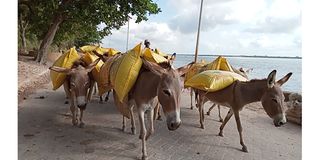
The donkey and human traffic in Lamu. One is likely to be caught up for several minutes in donkey traffic as you walk along the narrow alleyways of Lamu Old Town.
| Kalume Kazungu I Nation Media Group.Lamu
Premium
Inside the donkey traffic jam of Lamu
We are used to normal traffic jams involving automobiles and human traffic, mostly in major towns.
But things are different in Lamu island.
Traffic in this particular historical town is largely that of donkeys.
You are likely to be caught up for several minutes in donkey traffic as you walk along the narrow alleyways of the old town.
The situation is worse in the early mornings and late in the evenings when humans and donkeys are out to kick-start or end their day.

The donkey and human traffic in Lamu. One is likely to be caught up for several minutes in donkey traffic as you walk along the narrow alleyways of Lamu Old Town.
During these moments, the narrow pathways become almost impassable as they are always swollen with the donkeys transporting people or cargo.
The town is well known for its intact centuries-old culture, including the modes of transport, mainly donkeys and travelling on foot.
In Lamu town alone, there are more than 3,000 donkeys.
But why are there so many donkeys in Lamu, to the extent of causing traffic jams?
And why do they seem different from other beasts of burden in the rest of Kenya?
First, Lamu donkeys are not your normal animal.
These animals are part and parcel of households.
In Lamu, donkeys are treated with utmost care and respected just like one values fellow human beings.
Donkey owners spend a fortune to ensure their animals eat well, receive the required medication, work without exceeding the required time limit and sleep comfortably.
Lamu donkeys are also considered the most diligent and disciplined animals that you will ever see.
They are more treasured in Lamu Old Town than vehicles and motorcycles, as is the case in Shimoni, Mombasa, Voi, Malindi and other coastal towns.
Donkeys are also reliable transporters of goods to markets.
It is not uncommon to see a line of loaded donkeys heading off from Lamu town to the interior-most parts of the island without their masters but they still deliver the cargo safely to the right destination.
You may have wondered how the owners are able to train their donkeys so thoroughly.
Lamu elder Ali Fuad says locals have a common phrase,
“Ambacha Ukucha, Punda Uyao’, loosely translated to mean,
“Hold on to the nearest wall, the donkeys are coming”.
Lamu donkeys are renowned for their habit of exercising the right of way, especially when they are laden.
Mr Fuad explained that in most cases, it is pedestrians who move aside and allow donkeys to pass first before they continue with their own journey.
Unlike in other parts of the country where donkeys normally have carriages onto which goods are loaded, Lamu donkeys carry their loads directly on their bare backs no matter how heavy they are.
Lamu has the highest number of donkeys on the Swahili Coast, and the beasts make up 90 per cent of all animals reared by locals.

The donkey and human traffic in Lamu. One is likely to be caught up for several minutes in donkey traffic as you walk along the narrow alleyways of Lamu Old Town.
“Donkeys are crucial in almost all households in Lamu town. In fact, donkeys are the second-highest in population here after human beings. That’s why we always find ourselves in donkey traffic in this town,” Mr Fuad said.
Also interesting to note is that owning a donkey in Lamu is an expensive affair.
But locals strive to own these animals because a household without a donkey is considered incomplete.
The cost of a donkey in Lamu ranges from a low of Sh20,000 to a
The price of a donkey is determined by its colour, breed, sex and intended role, said Hussein Miji, a famed donkey owner in Lamu.
“We have different classes of donkeys. We have people who own donkeys for leisure while others use them for cargo,” he said.
“We also have donkeys with unusual colours like red and brown.
Such donkeys, especially male ones, are sold for as high as Sh50,000 or Sh60,000.”

The donkey and human traffic in Lamu. One is likely to be caught up for several minutes in donkey traffic as you walk along the narrow alleyways of Lamu Old Town.
Cargo donkeys, he said, are slightly more expensive than the others because they are profit-oriented compared with luxury ones, which do not generate income for the owner.
Another reason donkeys are ubiquitous in Lamu and contribute to the daily traffic on streets is that they are considered a source of security for households, because it is believed that, among other things, they keep away wild animals, especially lions.
Donkeys are also used to grace various occasions and celebrations in Lamu, a good example being the Lamu Maulid and cultural festivals held in January and November every year in the county.
As such, they form an integral and important part of the celebrations.
“In Lamu, celebrations are never complete if there are no donkeys to grace such occasions with races,” said elder Bwana Haji.
It is worth noting that the world-renowned donkey race in Lamu held during the Maulid and cultural festivals continues to be one of the leading events that draw into the county thousands of tourists and fun lovers from around the globe.
During the race, the donkeys compete fairly and winners are crowned and their owners receive handsome amounts of cash, among other gifts.

The donkey and human traffic in Lamu. One is likely to be caught up for several minutes in donkey traffic as you walk along the narrow alleyways of Lamu Old Town.
In other parts of the country, mentioning a donkey instantly conjures up a miserable-looking beast with tattered skin, laden with more than it can carry and being whipped.
In Lamu however, the donkey is treasured more than other livestock like goats, cows, camels, sheep, chickens, ducks and turkeys.
That is why donkeys are keenly well taken care of, worshipped and adored.
Lamu donkeys are taken to hospital whenever they fall ill. A donkey sanctuary was established in 1987 to specifically take care of the health of the beast of burden.
The centre takes care of sick, orphaned, old and abandoned donkeys free of charge, said Lamu Donkey Sanctuary officer in charge Mohamed Chemusa.
It offers inpatient and outpatient services for sick donkeys.
“We call upon donkey owners to bring their donkeys for checkups every time. We are located on the town’s seafront, just next to the Kenya Power offices,” he said.
But despite the traffic jams, for fun and adventure lovers who want to experience firsthand all this and more donkey-related experiences, Lamu is the perfect destination.





